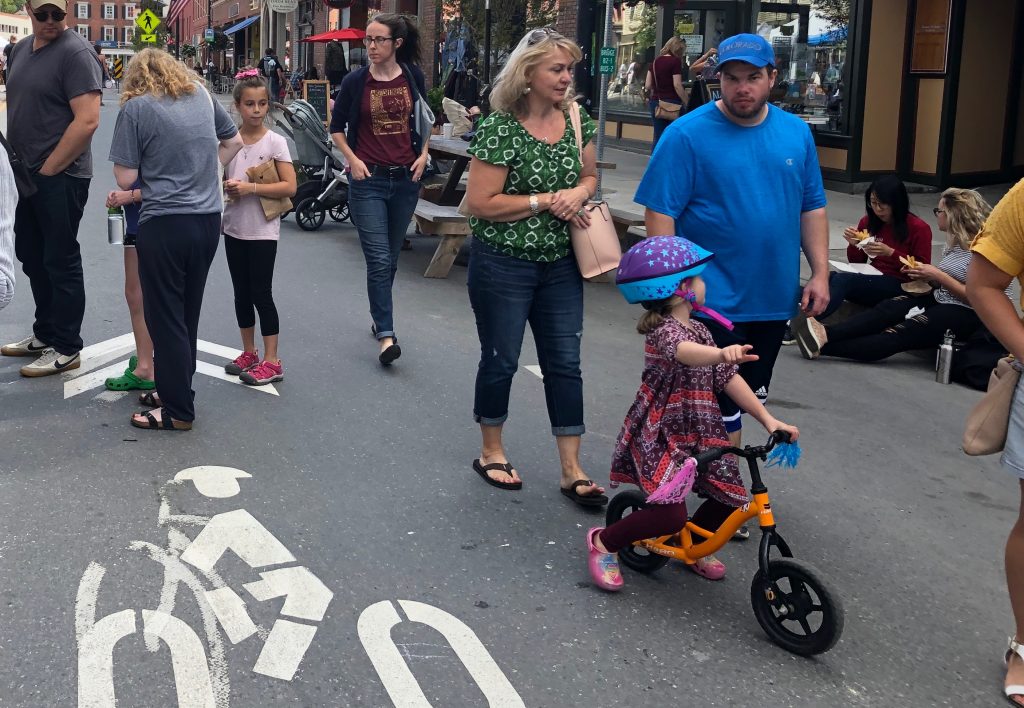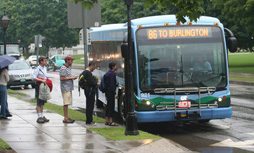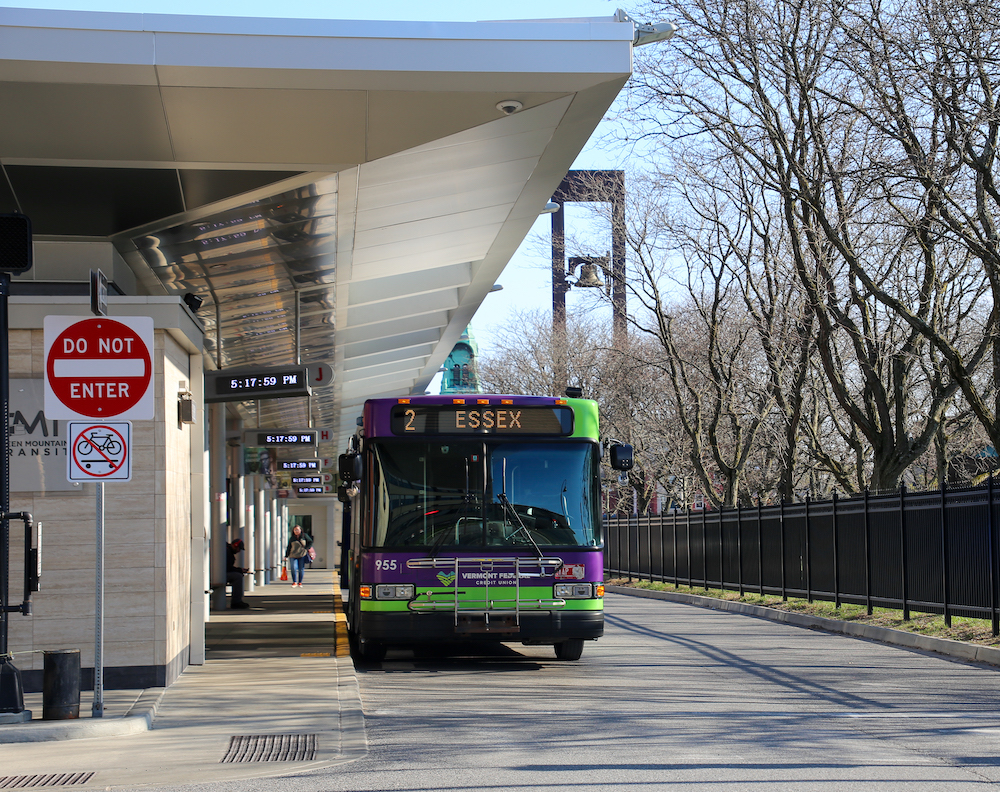About T4VT
Transportation for Vermonters (T4VT) is a diverse coalition of individuals, organizations, businesses and institutions committed to working together, creatively, and across sectors to achieve a sustainable, accessible transportation system in a rural state. Find a full list of members below.
Why T4VT?
Transportation is the largest source of air pollution and accounts for nearly half of the greenhouse gas emissions in Vermont.
This is partly because nearly all vehicles registered in the state are powered by fossil fuels. It is reinforced by our transportation infrastructure, which is predominately designed to support vehicular traffic, reducing opportunities for healthy, active transportation choices.
For nearly two decades, Vermont’s people, state agencies, transit providers, advocates, and others have made great strides to address sustainable mobility issues in the state. Successes have included increased transit, more sidewalks and bike facilities, investments in compact land use patterns, alternatively fueled vehicles, and policies that acknowledge the multiple benefits a transportation system can provide.
However, too many Vermonters still lack affordable, convenient, reliable transportation to schools, jobs, healthcare, and other services. Such access is essential for people’s quality of life (at every stage of life), economic opportunity, and health, as well as the state’s economy as a whole.
The time is right for Vermont organizations and leaders to work together to advance policies, plans and programs that expand mobility choices for all Vermonters, improving health, safety and quality of life, reducing environmental impacts, preventing sprawl, and strengthening the state’s economy.
2024 Policy Agenda

Click here to read our 2024 Policy Agenda. Find past years’ agendas below.
- 2023 Policy Agenda
- 2022 Policy Agenda
- 2021 Policy Agenda
- 2020 Policy Agenda
- 2019 Policy Agenda
Our main priorities in 2024 are to:
Overarching Priority | Advance a Long-Term Funding Source and Primary Policy Tool
The Legislature should maximize and leverage new federal funding opportunities, as well as look to the Carbon Reduction Strategy and Climate Action Plan to identify and adopt one or more policy or regulatory tools – like cap-and-invest – to make certain pollution reductions and secure a long-term, sustainable funding source for a multi-modal transportation system that serves all Vermonters well, now, and into a changing future.
Priority 1 | Develop a New, Multi-Modal State Mobility Program to Better Serve All
Gaps in state-level mobility coordination and service provision are leaving too many Vermonters stranded too often. The Legislature should explore a new state mobility program focused on moving people, not just vehicles, to improve and maximize the efficiency, integration and coordination of local and regional mobility services and leverage unprecedented federal funding to build a transportation network that is more efficient, equitable and accessible to all.
Priority 2 | Require VTrans to Prioritize Vulnerable Users First
Vermont currently has no accounting for how its most vulnerable users interact with its transportation systems. VTrans must provide an annual report to the Legislature on how the Vermont Transportation Equity Framework recommendations are being accomplished. VTrans must also describe how vulnerable users (as defined in statute) are being prioritized, including ensuring compliance with ADA requirements and other Vermont laws designed to protect vulnerable users.
Priority 3 | Increase Funding for the MTI Grant and E-Bike Incentives
The Legislature should expand its commitment to the popular E-Bike Incentive Program and allocate $500,000 to incentives in the FY 25 budget to ensure program consistency, reliability and access to this clean, affordable transportation option. Investment in the successful Mobility & Transportation Innovations (MTI) Program should be increased and restructured to provide multi-year grants, reliable timelines and funding expectations, and sufficient appropriations to support large-scale projects and implementation of services.
Priority 4 | Update Regulations to Better Protect Bicyclists and Pedestrians
Vermont bicyclists and pedestrians have been getting the short end of the spoke when it comes to regulatory protections. The Legislature should update regulations that strengthen mobility and safety for vulnerable users, wheelchair users, pedestrians, and bicyclists. T4VT supports the regulation changes outlined in H.685, including changing the safe passing requirement, updating the pedestrian definition to include wheelchair users, removing the sidewalk requirement, allowing bicycles to use pedestrian walk signals when parallel walk signals are present, and allowing bicyclists to utilize stop signs as yield signs.
Priority 5 | Increase Support for Municipalities Managing Complete Streets Projects
To achieve the wide-ranging benefits of Complete Streets, municipalities require greater financial support and control over projects to meet their unique needs. The Legislature should increase funding for the Bike and Pedestrian Grant Program, Downtown Transportation Fund, Better Places Program and Better Connections Program. VTrans should establish a policy manual that details potential avenues for municipalities to be provided more design flexibility on “main streets” located on state highways.
Statement of Principles on Act 250
As Vermont embarks on making updates to Act 250, it is critical that regulatory updates encourage compact community development to enable increased use of sustainable modes of transportation and the accompanying public health, community, climate and other benefits.
T4VT News
August 2022: Public Engagement Opportunities for Clean Transportation Rules
February 2021: Transportation for Vermonters releases 2021 policy agenda
July 2020: Legislative updates from 2019-2020 session (Passage of Transportation bill, GWSA, and other highlights)
June 2020: Letter to the Vermont Senate Transportation Committee stressing the importance of funding transportation priorities in COVID-19 recovery
January 2020: Investing in Clean, Convenient Transportation Choices Across our Rural State (commentary by Kate McCarthy)
January 2020: Transportation for Vermonters releases 2020 Policy Agenda
November 2019: T4VT participates in regional policy proposal for the Transportation Climate Initiative
April 2019: T4VT urges legislators to address emissions repair costs without undermining clean air
January 2018: VNRC submits comments regarding use of VW Mitigation Trust funds
Current members
AARP VT
CarShare Vermont
Chittenden Area Transportation Management Association
Green Mountain Transit
Local Motion
Renewable Energy Vermont
Vermont Center for Independent Living
Vermont Chapter of the Sierra Club
Vermont Clean Cities Coalition
Vermont Energy Education Program (VEEP)
Vermont Energy Investment Corporation
Vermont Natural Resources Council
Vermont Public Interest Research Group

For more information about Transportation for Vermonters, visit our website at www.t4vt.org or contact Kati Gallagher, Sustainable Communities Program Director at VNRC, at kgallagher@vnrc.org or 802-223-2328, x114.





